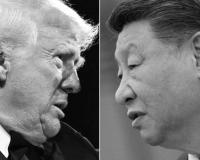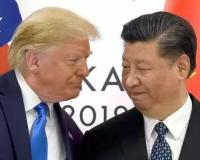The Colts of the Great Leaders of the Superpowers

By Rahi Bhide
Since his election as the President of the United States, the world has been aware of Donald Trump's arrogant attitude and authoritarian rule. There was a big movement in the United States against Trump, who made decisions with the arrogance of saying, 'Only I can do good for America.' Countries like Canada and Mexico forced Trump to withdraw. In two months, Trump had to backtrack on his decisions many times. Trump himself dragged this time out.
How Donald Trump, who became president again after four years, understood only now that America's trade with the countries of the world is unbalanced, and America is suffering a huge loss due to this, is the subject of research. Trump, who announced a tax policy as it was, had to withdraw twice in two months. On April 2, just seven days after imposing tariffs on about a hundred countries, he suspended this decision for 90 days. In the past months, tariffs were imposed on Canada and Mexico and then suspended for a month, but Trump has given a big blow to China by imposing a 125 percent tariff. It is interesting to know why Trump withdrew the tariff in seven days, what will be the impact of the US decision on India and how the tariff will be re-imposed after 90 days. Trump has given a 90-day moratorium on the reciprocal tariff imposed on more than 75 countries. A 10 percent baseline tariff was imposed on these countries. These 75 countries include India, Bangladesh, Pakistan, Taiwan, and Vietnam; however, Trump has excluded China from this decision. Trump has said that 75 countries have started discussions with the US Department of Commerce, Treasury, and the US Trade Representative on issues such as trade and currency manipulation. Many countries have cooperated on the tariff. These countries have not retaliated. I have given these countries a 90-day reprieve. During this period, only a 10 percent tariff will be imposed on them. Shortly after Trump's announcement, US Treasury Secretary Scott Besant said that this ban was part of our strategy from the beginning. We have tried to send a message to other countries that 'you don't retaliate, you will be rewarded.' That is, after announcing the tariffs, Trump wanted to see how many countries support his decision and how many oppose it. Trump wants to guess which countries will go with China and which countries will come with him. This is a ploy to divide the world into two groups.
Trump's 'tax as you please' policy was also affecting his close associates. Tesla chief Elon Musk lost millions of rupees. For many days, American industrialists, CEOs and Republican party leaders had been asking Trump to stop the tariffs. They feared that Trump could impose tariffs on all countries in the world and cause a recession in the United States. It could turn into a global recession. Trump decided to impose a 90-day ban on the advice of American hedge fund manager and Trump supporter Bill Ackman. Ackman had recently said that Trump's imposition of tariffs could trigger an economic nuclear war in the world. To avoid this, he was under pressure to stop the price hike. Ackman wrote in the post that this policy does not seem to be working. He warned that if the impact of the tariffs is not stopped immediately, small businesses will go bankrupt. Jamie Dimon, CEO of American financial firm JPMorgan Chase & Co., said in an interview with Fox News that a recession is almost certain due to the economic turmoil over the tariffs. Jamie's statement is being linked to Trump's decision. However, White House Press Secretary Carolyn Levitt said that the step to withdraw was part of Trump's larger strategy. Such a strategy has led to the collapse of US and global markets, causing millions of investors to flee their countries, raising questions about what happened and who is responsible for it. Trump's initial decision to suspend tariffs for 90 days is a no-brainer. There is no logic behind this. He talks to his billionaire friends, not economists and experts. After Trump announced tariffs on about a hundred countries, protests began around the world. Protests were held in more than twelve hundred cities in fifty states of the United States. Trump's tariffs caused the stock markets of the world, including the United States, India, and Japan, to fall by $10 trillion. US Treasury bond prices fell and interest rates rose. On April 8, the US stock market's Nasdaq fell another five percent. This shook the economies of many countries, including the United States. Suddenly, American bonds started selling. Crude oil prices also fell sharply. Americans feared that the increase in tariffs would make goods in the country more expensive. JPMorgan CEO Jamie Dimon called it an "economic crisis." Large companies like Walmart and Tesla said that the tariffs would increase their prices, make goods more expensive, and have a direct impact on consumers. Walmart CEO Doug McMillan said product prices could rise by 15 to 20 percent. Wall Street banks had warned that the tariffs would lead to inflation, rising unemployment and a recession in the United States.
Trump imposed 125 percent tariffs on China. China also imposed 84 percent tariffs on the US. The European Union also approved new tariffs on the US. Vietnam asked the US for 45 days and Bangladesh for three months. Former Canadian Prime Minister Justin Trudeau said that there is a threat to American jobs. Many of Trump's close advisors had advised stopping the tariff war. Many leaders of Trump's Republican Party were also against the tariffs. Trump's tariff hike had increased the probability of a recession from 40 to 60 percent. GDP is expected to fall by eight percent. The salaries of working people in the US could fall by up to seven percent. At the same time, a middle-class family could lose $58,000, or Rs 50 lakh. The University of Michigan's consumer index is at its lowest level in 3 years. This is used to estimate spending and investment. Now the biggest impact of Trump's withdrawal of tariffs has been seen on the US economy. On April 9, the US market closed at 12 percent. The US Nasdaq posted its biggest gain since 2001, while the Dow Jones posted its biggest gain since March 2020. Nearly 30 billion shares were traded in the US capital market, making it the biggest trading day in the history of Wall Street. Apart from this, Asian markets also saw a rise of more than nine percent. Perhaps due to late wisdom, America started to recover.
000








.jpeg)

